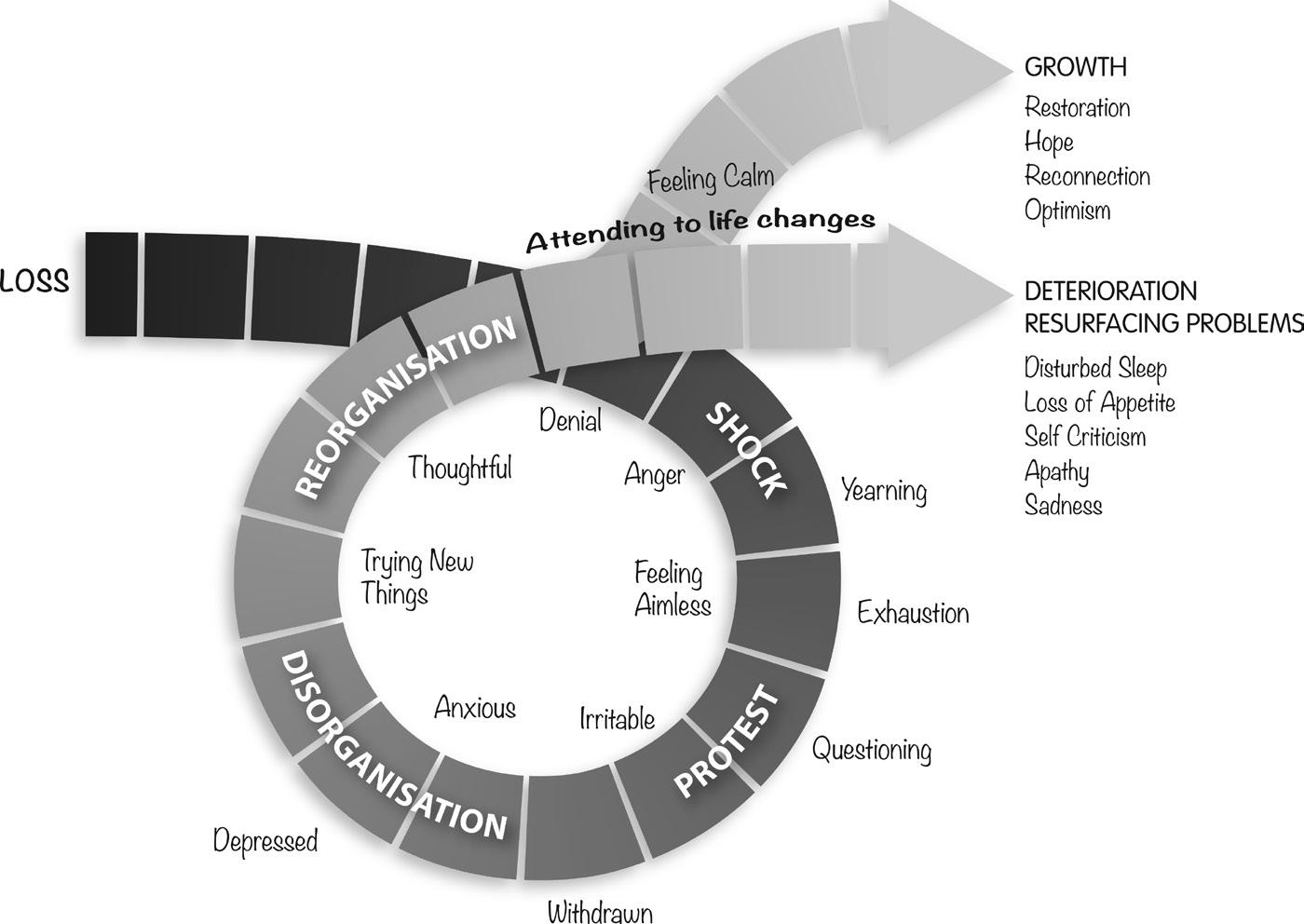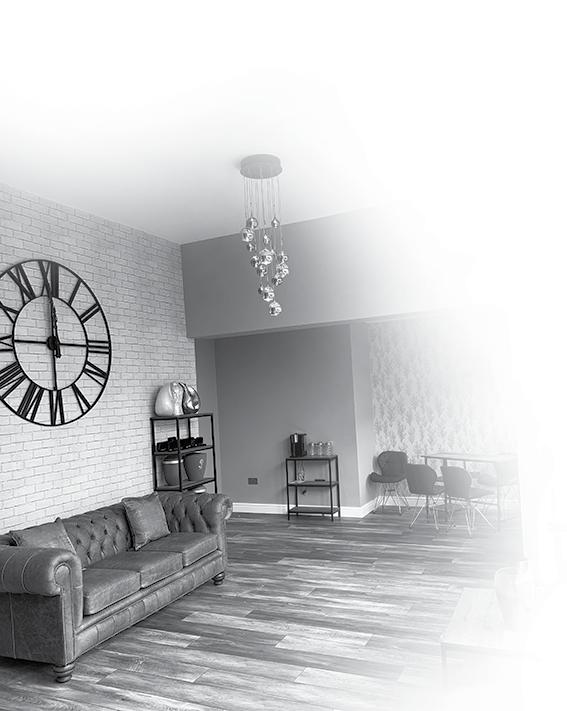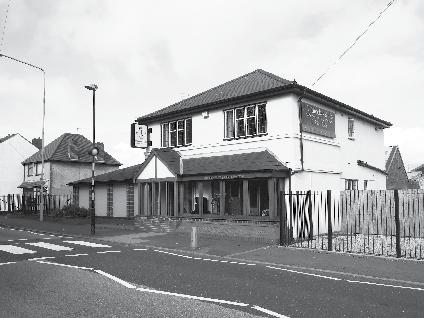
May we offer our sincere condolences to you and your family at this sad time.
This booklet aims to provide useful information and advice to assist you in the early days of your bereavement.


May we offer our sincere condolences to you and your family at this sad time.
This booklet aims to provide useful information and advice to assist you in the early days of your bereavement.
This bereavement booklet has been developed to assist families and friends with the practical requirements they face after death, to help them understand their grief, and to provide them with the contact details of some local support organisations.
The days following a bereavement are very difficult. Unfortunately, it is a period during which a number of matters must be dealt with. There are many decisions and arrangements that need to be made and dealing with the practicalities can feel overwhelming. All of this can be confusing and we hope this booklet will assist you during this time. You might find it helpful to seek support from someone else, like a family member, or someone outside the family whom you trust.
Loss is a deeply personal experience and we know that everyone has individual preferences. Therefore, it is important that you feel able to express your wishes, and seek support and advice so that we, and other people that support you, can best meet your needs. If you need help in any way, please do not hesitate to ask.
We understand that this is a deeply personal time and will support you if you need to stay for a while after the person has died. Their body will be cared for by the nursing staff at Mary Stevens Hospice just as carefully and respectfully as when they were alive and in accordance with their religious customs.
If you have chosen a local funeral director the deceased may be transferred into their care directly as we do not have mortuary facilities. However, if you choose a funeral director out of the area a local company will take care of the deceased until further arrangements are made.
The Medical Certificate of Cause of Death is sent by the Hospice doctor to the registrars electronically.
Any property or valuables i.e. jewellery/money etc. belonging to the deceased will be available for collection from the Hospice at a time to suit the family.
Regulations state that only certain people may register a death with the Registrar of Births, Marriages and Deaths. Please check with the Registry Office.
Once you receive confirmation that the Medical Certificate of Cause of Death has been received by the Register Office, you will need to make an appointment to register the death within five working days.
It would be helpful if you can take along the following information if possible:
• the person’s birth certificate.
• marriage or civil partnership certificate and details of any change of names.
When you register the death, the Registrar will ask you for the Medical Certificate of Cause of Death which gives the cause of death, unless the Coroner has asked for a post mortem.
The Registrar will need the following information:
• The date and place of death
• The date and place of birth
• The full names and any other names used of the person who has died (and maiden surname if this applies)
• Their occupation
• The usual address of the person who has died
• Whether the deceased was in receipt of a pension or allowance from public funds
• The full names of their husband/wife/civil partner and their occupation
• If the deceased was married or in a civil partnership, the date of birth of the surviving spouse or civil partner
The Registrar will give you:
A certificate of registration of death (form BD8). This is for social security purposes only.
Certified copies of the death certificate. Certificates are issued at the end of the appointment and the green form for the burial/cremation is emailed to the funeral director. You may need these for banks, building societies, solicitors or for pension/insurance claims. The register office will be able to advise on the possible number of copies required, but there will be a charge for each copy.
Certificates issued at the time of registration are £12.50 each. There is a £3.50 admin and processing fee per application for up to 5 certificates. These fees may have been updated in the meantime.
You will also receive a routine telephone call from the Medical Examiner at Russells Hall Hospital.
To book online visit www.dudley.gov.uk/register-a-death
Email the office with a contact number register.office@dudley.gov.uk
Or call Dudley Council Plus on 0300 555 2345 to book by telephone.
The telephone line can be very busy and you may wait in a queue before speaking to the correct person. In this instance, there is an option to send an email direct to the Registrar’s office. It is essential that you leave a contact name and number so that they can respond to your message as soon as they can.
Dudley Register Office
Priory Hall
Priory Park
Dudley DY1 4EU
Parking: you may drive right into the grounds of Priory Park. There are parking spaces outside the building. There is also on-street parking available and pay and display car parks close by.
Dudley Council Plus 259 Castle Street
Dudley West Midlands DY1 1LQ
Parking: parking is available on the Fellows Restaurant car park which is pay and display. On leaving the car park cross the road towards the town centre and the office is just a little way up Castle Street on the right.
Stourbridge Registration Office,
Thomas Robinson Building Cemetery Road
Lye
Stourbridge West Midlands DY9 8AN
By appointment only
Tell Us Once is a free service offered by the Dudley Registration Service at any death registration appointment. It means the service will, on your behalf, notify all of the government organisations that need to know. This will ease your burden and greatly reduce the amount of time you need to spend contacting organisations about the death.
This service will provide the relevant information to the Department for Work and Pensions (DWP), who will pass that information onto the people who need to know. We really would urge you to take the opportunity to use the service, which will make things so much simpler and easier for you.
If you decide to use the Tell Us Once service, they will tell the following departments and organisations of the death, on your behalf;
Council services
• Council housing
• Housing and council tax benefit
• Council tax
• Libraries
• Blue badges (cancelled if badge brought to the department)
• Adult social care (including attendance allowance)
• Children’s services (including child benefits)
• Collection of payments for council services
• Electoral services
• Department for Work and Pensions
• Universal Credit
• State Pension
• HM Revenue and Customs
• Child benefit
• Child tax credit and working tax credit
• HM Passport Office
• Passport cancellation (only if passport brought to appointment)
• Driver and Vehicle Licensing Agency
• Driving licence cancellation (only if licence brought to appointment)
• Ministry of Defence, Service Personnel and Veterans Agency
• War pensions scheme
Using the Tell Us Once service when registering a death takes slightly longer; but is well worth using. The information you provide will be treated securely and confidentially. It will be used to update benefits, credits or to help start up services. Information they may need to know:
• name, date of birth, address and date of death.
• name, address and contact details of the person or company dealing with their estate known as their ‘executor’ or ‘administrator’.
• if there’s a surviving spouse or civil partner, the name, address, telephone number and the National Insurance number or date of birth of the spouse or civil partner.
• if there’s no surviving spouse or civil partner or their spouse or civil partner is not able to deal with their affairs, the name and address of their next of kin.
• if they died in a hospital, nursing home, care home or hospice, the name and address of that institution.
• if they had a passport, their passport number and town of birth.
• if they had a driving licence, their driving licence number.
• if they owned any vehicles, the vehicle registration numbers.
• if they were getting services from their local council, such as Housing Benefit payments or Council Tax reductions, the name of their local council and which services they were getting.
• if they were getting any benefits, tax credits or State Pension, information about which ones they were getting.
• if they were getting money from an Armed Forces Pension or Compensation Scheme, details of that scheme.
• if they were getting money or paying into public sector pension schemes, details of those schemes.
• if they were getting money or paying into Local Government Pension Schemes (LGPS), details of those schemes and their National Insurance number.
At the end of the appointment, you will be provided with a unique reference number and a list of all organisations and departments being notified on your behalf. If you have any future queries you should contact Dudley Council Plus on 0300 555 2345.
There are various people, companies and other interested parties who need to be informed of the death, especially if the deceased lived alone.
• Hospital Consultant and other health care professionals.
• The Family Doctor.
• Macmillan/District nurses.
• Social Services if meals on wheels, home help or day centre transport were used.
• The local Inland Revenue Office.
• The local Social Security Office to cancel pensions, allowances, benefits etc.
• Any employer or trade union.
• A child’s or young person’s teacher, employer or college should be informed, if parent, brother, sister, grandparent or close friend has died.
• Car insurance company. People driving a car insured in the deceased name are not legally insured.
• Local office of gas, electricity, telephone company, mail deliveries, local newsagents, milkman.
• Professional organisation.
• Local authority housing department, if deceased was receiving Housing Benefits/Council Tax Benefits or was living in property rented from the Council.
• Private landlord.
Items such as order books and giro cheques will have to be returned to the appropriate Social Security Office. Make a note of any pension book or order book numbers before you send them back.
The deceased’s passport, driving licence, car registration documents, membership cards and National Insurance papers must all be returned to the relevant offices. Check for any library books that might need returning. If there was any NHS equipment being used it will need to be returned to the hospital or health centre from which it came.
Funerals are expensive and although basic costs tend to be similar the final cost can vary considerably. Do not be afraid to mention your budget or obtain estimates from several funeral directors.
Financial help with funeral costs and in the future may be available if you receive benefits or if the person who has died has no next of kin. Contact the Department for Work & Pensions 0800 151 2012 or www.gov.uk/ bereavement-payment/how-to-claim
The charity Down to Earth can also help - 020 8983 5055 or www.quakersocialaction.org.uk/we-can-help/helping-bereavement/ down-earth/how-it-works
Our Patient & Family Support Services Team, notably our Social Worker are able to offer advice on gaining access to financial help.
Sometime soon, you will want to prepare to say ‘goodbye’ to your loved one in the best possible way. Arranging the funeral itself may not be an easy thing to think about. However, if done well, it can be an enormous help as you try and come to terms with your loss.
Our Spiritual Care Coordinator has wide experience of planning and conducting funeral services. They would be glad to talk things over with you and suggest ways forward. If available, they might also be able to conduct the service. Providing a link with the Hospice could perhaps make it more personal, especially if they spent time with you or your loved one.
We believe a funeral should be true to the deceased, reflecting their values and beliefs, life and loves. It can be a time to remember with gratitude as well as sadness, to celebrate as well as find comfort.
Funeral services may be taken by the representative of a faith community - e.g., church minister. Others are conducted by independent funeral celebrants, some of whom are happy to include elements of religious faith or a spiritual path. Again, our Spiritual Care Coordinator can help you with this, as will your funeral director.
If the deceased person has made a will, it may include funeral requests. You will want to honour these, if possible, but final responsibility lies with the executors or the persons legally entitled to deal with the person’s estate.
Here are some things to consider when thinking about the service.
Music: Whether songs or instrumentals, music can lift our spirits, stir emotions, bring back memories and help us pay our respects.
Readings: Poems, letters, excerpts from books (including sacred texts), anecdotes, guided reflections? It is up to you.
Prayer or silence: Prayer, silent reflection or a blessing of some kind can be very meaningful – whatever is appropriate.
Tribute/eulogy: There are various ways of approaching this, but it is normally a key part of the funeral service.
Reminders: You might ask people to record their memories in a journal. Photographs can be displayed. Something personal (e.g., walking boots), could be on view. You could give people a keepsake to take home, small things which connect with a memory of your loved one.

This diagram is intended to demonstrate that there is no set pattern or experience of grief. Maybe you will recognise and identify with some of this in your experiences and know that others have felt something similar, and those that offer care at this time can understand. Moving towards a sense of recovery where you learn to live with your relative/ friend’s death can sometimes feel like finding a ‘new normal’.
Grief knocks you off balance. You may find yourself having to cope with a world which feels very different as you go through a process of mourning.
Grief can be a painful process. Everyone is different but there are some common experiences such as:
• Anxiety
• Vivid memories
• Problems with sleeping
• Feeling of sadness and longing
• Mood swings
• Feelings of anger
• Feelings of guilt or shame
• Changing personality/behaviour
• Difficulty in caring for others
• Work difficulties
In the initial shock of a loss, people can feel a sense of numbness and disbelief. You may feel detached and separate from others you love, even if they are physically close. Life can feel very chaotic. You may not feel anything at all.
Alongside the deep pain and sadness, you may feel agitated and angry about what has happened, and indeed about the person who had died. This can result in feelings of guilt and further detachment.
You may think that you are going mad, that things do not make sense, you cannot concentrate. You may struggle to organise things as you have done before.
Over time these agitated feelings may shift to deep fatigue, depression and exhaustion and then move towards a position of reflection, feeling calmer and better able to try new things.
You may fear forgetting or remembering wrongly, and this can and does happen. Trust there will always be a part of them in your life.
As part of the cycle of any loss, in times of pain and weakness, it is not unusual for old feelings to resurface (or memories of earlier losses) and to feel that things are deteriorating emotionally. This may take you back through things you may feel you have already overcome. Trust in your own resources, get plenty of rest and use the support available to you, family, friends and more formal support agencies.
At times when the sadness lessens and you find yourself feeling happy and laughing, do not see this as a betrayal but rather as a tribute.
These are the experiences of some people who have suffered bereavement.
“Bereavement may be a very lonely time. All the familiar things change, and you miss the banter and comfort of relating everyday things to that “special” person who is no longer there. You have to learn to live a different life and try to see the positive and not the negatives. It’s not always easy but talking to people and putting yourself in new situations can be very helpful and you eventually think more about the happy times you shared with your loved one and feel very lucky to have had them in your life”.
“Though I understand that she is not physically here, I simply keep myself busy with doing anything that I think she would approve of or something that I could tell her. I believe that she is still with me and all those she loves. I guess in the short term, anything that reminds me of her, is what I immerse myself in”.
“Time in my opinion really doesn’t seem to heal us, but it helps us learn to deal with our loss and continue to move forward. The tears will always continue to be shed, but we have the memories that will be forever locked in our minds and in our hearts”.
“For a while there was a steady stream of condolences and sympathy cards. But they eventually trickled to nothing. The shock was still there, but it was wearing off and the raw pain of grief began to take hold of me”.
There are some fundamental things you can do to help yourself regarding your overall wellbeing.
• Don’t be rushed by the expectations of others. There are no rules.
• Try not to hurry the healing process, take it at your own pace.
• Do try to look after yourself. Get plenty of rest. Try spending a little time with others.
• Ask for help and support from family, friends or a support group.
• Do talk about the person who has died to people who understand.
• Ask for help.
The websites listed in this booklet also offer useful information.
If you are struggling with grief or simply finding it really hard, there are a number of organisations that can help.
It is a good idea to speak with your GP or someone who can help you get the care you need. Support is available, if you don’t find the support that suits you then keep asking and looking.
The experience of accessing external support is well reflected in these comments:
“Thank you so much for finding the time to listen to me about my mother’s death. I truly appreciate your talking with me and explaining the issues surrounding end of life care. I now feel more at rest with myself”.
“It has given me back the feeling that I have a life to move on to”.
Include them as much as you can, tell them as much as you can, reassure them as much as you can.
Evidence tells us that the best support a child can get in grief is seeing the adults around them grieving. Like adults, they too find it hard to understand and cope if they are not told what is happening. When information is kept from children, sometimes their imagination can make the situation far more frightening as they seek to make sense of what is happening around them. It can lead to them feeling isolated and excluded.
• Use simple and honest language when talking with them.
• Give them time and the opportunity to ask questions.
• Give them plenty of love and reassurance.
• Share your own emotions, this helps children to learn that it is okay and healthy to express emotions.
• Give children the space and opportunity to draw, write stories, and express themselves as they wish in order to say goodbye to the person who has died.
• Offer children the opportunity to participate in the funeral if they wish to, and you feel comfortable with that.
At the Hospice we provide care and support for patients and their families through the patient’s illness and in to bereavement if required. Confidential assistance may be offered for emotional support or through sign posting to other services.
Patient & Family Support Services include:
Social Work: Legal or financial advice and support in the community.
Spiritual Care: Help with funerals and bereavement support.
Volunteers Coordination: Enabling the many people who give their time to support the work of the Mary Stevens Hospice.
Bereavement Services: The Bereavement Services team sits within the Patient & Family Support Service and offers free support as outlined below. We make contact with bereaved individuals at two months and 12 months after the date of death. However, we do not wish to impose, so please let us know if you do not want to be contacted.
Supportive Listening: Our supportive listening service provides free face to face and/or telephone support on an individual basis. The hospice bereavement service gives you the opportunity to share your story with a carefully selected and trained volunteer.
Our bereavement volunteers are caring and sensitive people willing to listen. Our volunteers are from various backgrounds and have a wealth of knowledge and experience in issues related to loss and grief.
Bereavement Hub: Our hub drop-in session offers the opportunity to meet others who have experienced the loss of losing someone. We aim to offer a safe and secure environment to help support people irrespective of how long they were bereaved. Do contact us if you’d like to find out more.
Telephone Line: Our telephone service offers timely, practical, and compassionate support including signposting. Available over 7 days a week between the hours of 8am-4pm. The number is 01384 445417.
For further information or help, please contact:
The Bereavement Support Service
Mary Stevens Hospice 221 Hagley Road, Oldswinford, Stourbridge, West Midlands, DY8 2JR
Email: pafss@marystevenshospice.co.uk 01384 445423
We have listed several organisations who may offer you support. It is sometimes easier to talk to a stranger on the telephone about the way you feel rather than someone that is close to you.
Cruse Bereavement Care is the leading national charity for bereaved people in England. They offer support, advice and information to children, young people, and adults when someone dies and work to enhance society’s care of bereaved people.
Wolverhampton & Dudley: 01902 420055
National Helpline 0808 808 1677
The National Association for End-of-Life Care. Bereavement Support www.omega.uk.net
Please telephone 01743 245 088
Omega is also the home of Chatterbox Action Against Loneliness and Crisis Support Programme, a confidential telephone support service. email chatterbox@omega.uk.net
Samaritans
Provide confidential, non-judgemental emotional support 24 hours a day. www.samaritans.org
Tel 116 123 jo@samaritans.org
MIND
www.mind.org.uk Infoline: 0300 123 3393
Email: info@mind.org.uk Text 86463
Our Infoline provides an information and signposting service 9am to 6pm, Monday to Friday (except for bank holidays). Ask us about: mental health problems, where to get help near you and treatment options.
The Dudley District Citizens Advice Bureau provide free, independent, and confidential information and advice. General advice is available at www. adviceguide.org.uk.
Tel: advice 0800 144 8848 (Monday to Friday- 10am to 4pm).
The Silver Line – Helpline for Older People
www.thesilverline.org.uk
0800 4 70 80 90
The Silver Line is the only free confidential helpline providing information, friendship and advice to older people, open 24 hours a day, every day of the year.
The Silver Line Helpline provides three functions to support older people: a sign-posting service to link them into the many, varied services that exist around the country.
A befriending service to combat loneliness. A means of empowering those who may be suffering abuse and neglect.
www.widowedandyoung.org.uk
Support for those who are widowed (under the age of 50).
Way Up is an active, online self-help group aimed at providing mutual support to those who have been widowed primarily, but not exclusively, in their 50’s and 60’s. www.way-up.co.uk
The White House can provide one-to-one as well as group support for those who have lost a loved one to cancer.
Please call the White House on 01384 231232 for further information or look on their website: www.support4cancer.org.uk
Compassionate Friends
www.tcf.org.uk 0345 123 2304
An organisation of bereaved parents and their families offering understanding and support.
Stourbridge Bereavement Support Group
TLC is a small friendship-based group, which meets at Chawn Hill Church Centre, Chawn Hill Stourbridge.
They also have social events e.g., lunchtime meals at local pubs and restaurants and occasional outings.
For more information contact: Anita Tollerton 07964 858349 vatollerton@outlook.com
Maureen Giles 07758 709671 maureengiles7@hotmail.co.uk
Chawn Hill Church Office 01384 397287 admin@chawnhillchurch.org.uk
Muslim Bereavement Support 020 3468 7333 info@mbss.org.uk www.mbss.org.uk
Jewish Bereavement Counselling Service 0208 951 3881 enquiries@jbcs.org.uk www.jbcs.org.uk
BAMESTREAM: Bereavement Support
Anyone over 18 years of age who identifies as black, Asian or any other minoritized ethnicity. www.baatn.org.uk/bamestream-bereavement-support-service
Child Bereavement UK
Child Bereavement UK supports families and educates professionals when a baby or child of any age dies or is dying, or when a child is facing bereavement. Their vision is for all families to have the support they need to rebuild their lives. They provide confidential support, information, and guidance.
Professionally trained bereavement support workers are available to take calls 9am-5pm Monday-Friday. Tel: 0800 02 888 40
Edward’s Trust
www.edwardstrust.org.uk
0121 454 1705
A holistic approach to bereavement support for adults and children.
Winston’s Wish
www.winstonswish.org.uk
08088 020 021
Winston’s Wish national helpline offers support, information, and guidance to all those caring for a child or young person who has been bereaved.
Hope Again
Hope Again is designed for young people by young people. It includes information and forums where young people can share their experiences. www.hopeagain.org.uk
The What? Centre
info.thewhatcentre@gmail.com
Stourbridge 01384 379992
Dudley 01384 885488
A young person’s advice and counselling service – age 13 -25 years.
Mary Stevens Hospice is grateful to the sponsors and advertisers for their support with this booklet, without whom publication would not be possible. This should not, however, be taken as a recommendation by the Hospice of the products or services offered.
This booklet is for general information only and is not a complete statement of the law. Information contained in this booklet was correct at the time of printing. However, regulations and/or local circumstances may change, and readers are advised to check details with the Registration Service. Whilst every care has been taken in compiling this publication, Mary Stevens Hospice cannot accept responsibility for inaccuracies.
We are always pleased to receive suggestions (including any complaints) from you and your family, as these may help us to improve our services. We also welcome comments about this booklet.
Please contact the Registered Manager, Claire Towns at: Mary Stevens Hospice, 221 Hagley Road, Oldswinford, Stourbridge DY8 2JR Tel: 01384 443010 Email: claire.towns@marystevenshospice.co.uk
Although we are independent of the NHS and social care services, there are occasions when we are required to exchange information about patients with them. For example, Clinical Commissioning Groups contribute to the cost of care for patients from its area and needs to know how many of their residents are receiving care. Any information is treated in the strictest confidence, on a need-to-know basis only, and the greatest care is taken to protect personal details.
Although Mary Stevens Hospice is an independent charity, we are regulated by the Care Quality Commission, which inspects the Hospice on a regular basis to ensure we are following high standards of care. You are welcome to send comments to:
Care Quality Commission National Correspondence Citygate Gallowgate
Newcastle Upon Tyne NE1 4PA
Telephone: 03000 616161
Email: enquiries@cqc.org.uk
Reference: The Mary Stevens Hospice Bereavement Book
Review date: November 2026
Publication date: November 2024

The Hospice would like to thank RNS Publications for publishing this information and the following pages contain some features from services o ering their help at this time.
Whilst the Hospice is grateful of their support it does not endorse or recommend any of the services that they provide.

stopping mail
It is distressing to deal with a bereavement and unsolicited mail can be insensitive and destructive during a grieving process.
By scanning the below QR code on your phone or visiting www.stopmail.co.uk, we are able to securely share this information with mailing organisations and under the Data Protection Act the information will not be used for any other purpose.
Other benefits reduce the possibility of identity fraud, such as assumed identity and you will only have to supply the information once.





















Every life is unique, and every goodbye can be too.
Create a funeral with us that's right for you and for them.
833 High Street, Kingswinford, DY6 8AA 01384 912797
12 Hagley Road, Stourbridge, DY8 1PS 01384 912558
A. J. Timmins & Son Funeral Directors, 142 Stourbridge Road, Halesowen, B63 3UJ 0121 468 9038



















